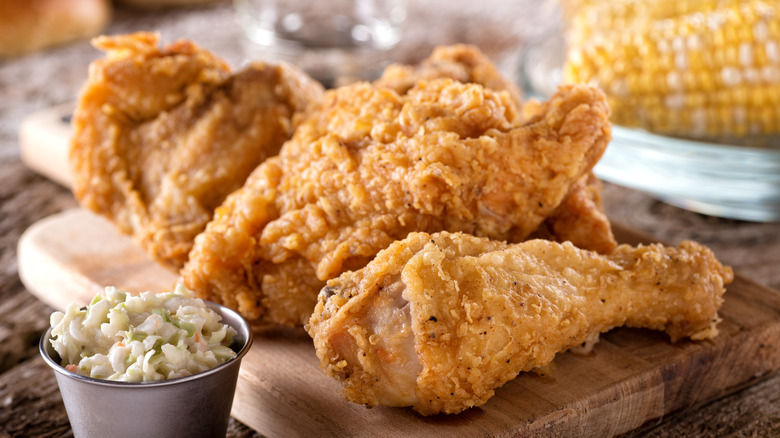The Little-Known Significance Of Fried Chicken In America
We can accurately credit North America with the invention of the Southern-style fried chicken that reigns as one of the country's favorite foods today, popular everywhere from fast food chains to down-home diners. According to Smithsonian Magazine, the first American fried chicken recipe to have been published was printed in an 1825 cookbook called "The Virginia Housewife Or, Methodical Cook." BBC confirms the advent of the deep-fried bird we know today, perfected and popularized by enslaved Black Americans, to have occurred between the 17th and 19th centuries. Eater pinpoints the 1700s as the earliest written mention of fried chicken in America, when then-Virginia governor William Byrd sang its praises in a journal.
The historical significance of fried chicken does not end with its invention. According to The Guardian, chickens were the only form of livestock that Black Americans were allowed to keep as slaves. Enslaved Black women, in particular, became known for their proficiency at cooking fried chicken for their masters — and then for the public after the Civil War, cementing its status as one of America's most-recognized culinary symbols.
Fried chicken and the liberated Black woman
After slavery was abolished, formerly enslaved Black cooks and housekeepers were able to apply their skills at preparing chicken recipes and other foods to their own empowerment, using them to make a living. An example of this was in Gordonsville, Virginia, then and now known as the "Fried Chicken Capital of the World." In the mid to late 19th century, the city was a commuter hub, explains American University Radio, and a major stop for two train lines. The trains of that era lacked dining cars, which presented an economic opportunity for recently liberated Black women to sell their food (specifically, fried chicken) to commuters through the windows of the trains. This practice earned them the name "chicken vendors," per The Historical Marker Database.
After the arrival of the first dining cars, Black women were unable to keep serving their chicken through train windows; for a time, they continued supplying chicken to the dining cars directly, per Culture Trip. These days, a Gordonsville plaque commemorates the town's "first Black female entrepreneurs," who were able to find a source of independence and livelihood after enslavement, Debra Freeman writes Eater. Though a local festival celebrates fried chicken every year, it does little to educate about Black women's role in its existence. "Black women are the reason you can look at menus all over the country and see fried chicken," writes Freeman. "It is clear their hands have touched nearly every facet of what we consider American food, yet their achievements are rarely spoken about or celebrated."

